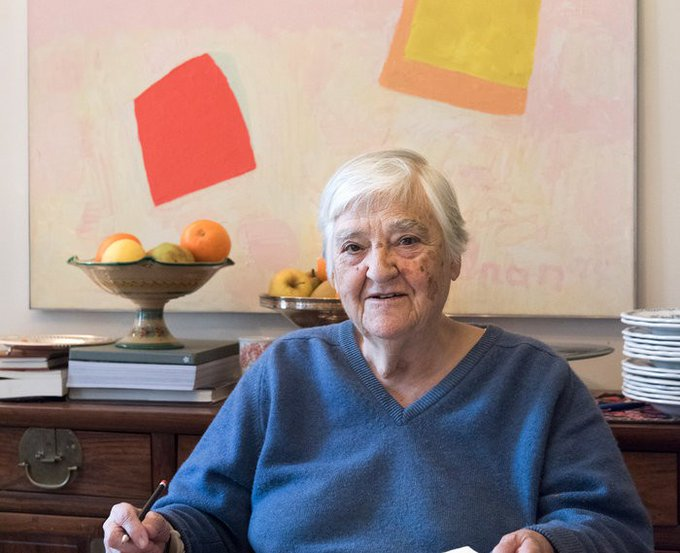De Syrisch-Amerikaanse dichteres, essayiste en beeldend kunstenares Etel Adnanwerd op 24 februari 1925 in Beiroet, destijds de hoofdstad van Frans-Libanon, geboren. Haar moeder was een Grieks-orthodoxe vrouw uit Smyrna, terwijl haar vader een Turkse officier uit Damascus (Ottomaans Syrië) was. Haar ouders ontmoetten elkaar in Smyrna tijdens de Eerste Wereldoorlog, waar haar vader als gouverneur van Smyrna diende. Nadat het Ottomaanse Rijk was ingestort en Smyrna verbrand werd tijdens de bezetting, vluchtten haar ouders naar Beiroet. Adnan groeide op in Beiroet en sprak thuis Turks en Grieks, terwijl Arabisch de belangrijkste taal van de Libanese samenleving was. Ze kreeg onderwijs op Franse kloosterscholen en Frans werd de taal waarin ze haar vroege werk schreef. Ze studeerde later ook Engels, waardoor haar latere werk vooral in deze taal is geschreven. Ze volgde opleidingen aan de Universiteit van Parijs, Harvard en de Universiteit van Californië – Berkeley. In haar latere leven identificeerde Adnan zichzelf als lesbienne en verruilde Beiroet in de jaren tachtig samen met haar partner Simone Fattal (geb. 1942) voor Californië.In 2003 werd Adnan door het academische tijdschrift MELUS “de meest gevierde en ervaren Arabisch-Amerikaanse auteur die vandaag de dag schrijft” genoemd. Naast haar literaire output, bleef Adnan visuele werken produceren in verschillende media, zoals olieverfschilderijen, films en wandtapijten, die in galerieën over de hele wereld zijn tentoongesteld.In 2017 was het werk van Adnan opgenomen in ‘Making Space: Women Artists and Postwar Abstraction’, een groepstentoonstelling georganiseerd door het MoMA, die prominente kunstenaars samenbracht, waaronder Ruth Asawa, Gertrudes Altschul, Anni Albers, Magdalena Abakanowicz, Lygia Clark en Lygia Pape.
Uit: In the Heart of the Heart of Another Country
To Be In A Time Of War
To say nothing, do nothing, mark time, to bend, to straighten up,
to blame oneself, to stand, to go toward the window,
to change one’s mind in the process, to return to one’s chair, to
stand again, to go to the bathroom, to close the door, to then open
the door, to go to the kitchen, to not eat nor drink, to return to
the table, to be bored, to take a few steps on the
rug, to come close to the chimney, to look at it, to find it dull,
to turn left until the main door, to come back to the
room, to hesitate, to go on, just a bit, a trifle, to stop, to
pull the right side of the curtain, then the other side, to stare
at the wall.
To look at the watch, the clock, the alarm clock, to listen to
the ticking, to think about it to look again, to go to the tap, to
open the refrigerator, to close it, to open the door, to feel the
cold, to close the door, to feel hungry, to wait, to wait for –
dinner time, to go to the kitchen, to reopen the fridge, to take
out the cheese, to open the drawer, to take out a knife, to carry
the cheese and enter the dining room, to rest the plate on the
table, to lay the table for one, to sit down, to cut the cheese in
four servings, to take a bite, to introduce the cheese in the ;
mouth, to chew and swallow, to forget to swallow, to day-dream,
to chew again, to go back to the kitchen, to wipe one’s mouth,
to wash one’s hands , to dry them, to put the cheese back into the
refrigerator, to close that door, to let go of the day.
To listen to the radio, to put it off, to walk a bit, to think,
to give up thinking, to look for the key, to wonder, to do nothing,
to regret the passing of time, to find a solution, to want to go to
the beach, to tell that the sun is coming down, to hurry, to go down
with the key, to open the car’s door, to sit, to pull in the door,
put in the key, turn it on, heat the engine, to listen, to make
sure nobody’s around, to pull back, to go ahead, to turn right, then
left, to drive straight on, to follow the road, to take many
curbs, to drive down the coast, look at the ocean, to admire it,
to feel happy, to go up the hill, to reach the other side, then
go straight, to stop, to make sure that the ocean has not disappeared,
to feel lucky, to stop the engine, to open the door, to exit, to
close the door, to look straight ahead, to appreciate the breeze,
to advance into the waves.
XLIV from The Arab Apocalypse
Where do you want ghosts to reside?
In our wakeful hours there are flowers which produce nightmares
We burned continents of silence the future of nations
the breathing of the fighters got thicker became like oxen’s
there is in that breath sparkles of scorched flesh and the fainting of stars
we crucify Gilgamesh on a TANK Viking II reaches Mars
Imam Ali dances over a nuclear blast
cursed are the clouds which repel water
cursed are the Arabs who fell tall and haggard eucalyptus trees

